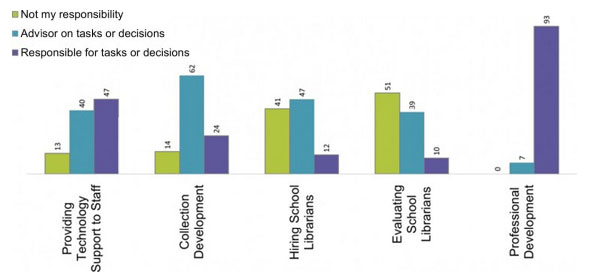
New research results from the Lilead Project showcase the first national effort to study school district library supervisors since the 1960s. Funded by IMLS and deployed by the University of Maryland College of Information Studies, the Lilead Project collected data via a national survey (which they intend to repeat) for a baseline for future research and established a professional development network and Fellows Program for those who coordinate a school district’s library program.
Focusing on supervisors from districts with 25,000+ students, the survey, which was administered in fall 2012, covered topics ranging from job titles to challenges experienced. The survey also gathered demographics data to profile the typical school district library supervisor. The overwhelming majority of the 166 respondents were female (80%) and white (87%), and nearly 3 in 4 (72%) were former classroom teachers. Perhaps most telling is that about half (49%) were 55-64 years old and nearing retirement age.
Nearly all respondents (93%) reported that they were responsible for tasks/decisions related to providing professional development for library staff. Not quite half (47%) also provided technology support to staff. However, only 1 in 10 district library supervisors were responsible for evaluating school librarians, and just 12% were responsible for hiring librarians.
The final segment of the survey investigated challenges and issues faced by school district library supervisors. More than 2 in 5 (42%) reported a decrease in both funding and staffing in building-level libraries from the previous year. More than 1 in 5 (22%) saw a drop in technology funding. Changes in curriculum were also felt by this group: About 4 in 5 (78%) experienced more emphasis on content standards while 3 in 5 reported greater emphasis on information literacy from the year before. District library supervisors are also spending more time talking about the library’s role in student achievement and encouraging collaboration between librarians and classroom teachers. But the most important responsibility for these district library supervisors? Leadership – more than 4 in 5 (83%) said their leadership responsibilities were extremely important or important.
Learn more about budget challenges and staffing and read comments from survey respondents in American Libraries or visit the Lilead Project website.
Note: This post is part of our series, “The Weekly Number.” In this series, we highlight statistics that help tell the story of the 21st-century library.